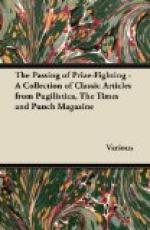The matter was pleasant enough, but its interest must, I think, have left us indifferent if it had not been for the diversion afforded by the playlets. While the idea was original, the presentation of it seemed to have a touch of amateurishness, though I would not go so far as to agree with the old fogey, played by Mr. FRED KERR, who pronounced the scheme to be “all Tommy rot.” With the exception of one character—the devoted slave—the lightness of the dialogue, mildly cynical, was due not so much to its wit as to the absence of ponderable stuff. The easy trick, so popular with the modern playwright, of letting the audience down in the middle of a serious situation was illustrated by the hero when, being in deadly earnest, he tells every woman in turn that she is the only woman he has ever loved.
As Mr. Todd, Mr. HOLMAN CLARK was as fresh as he always is; but Mr. OWEN NARES could hardly hope to satisfy the exigent demands of adoration in the part of young Carrington. Who, indeed, could sustain his reputation as a figure of romance when addressed as “Arthur-John”? Mr. FRED KERR, who played Martin Carrington, the cantankerous uncle, cannot help being workmanlike; but he was asked to repeat himself too much. The best performance was that of Miss MARION LORNE, in the part of the hero’s one devout lover, Fancy Phipps; her quiet sense of humour, salted with a slight American tang, kept the whole play together.
O.S.
“TEA FOR THREE.”
Playwright Mr. ROI COOPER-MEGRUE, and principal players Miss FAY COMPTON, the wife; Mr. STANLEY LOGAN, the friend, and Mr. A.E. MATTHEWS, the husband, made a first-rate thing of two-thirds of Tea for Three.
The wife is without blemish physically or morally. The husband is faithful with a single-minded fidelity in thought, word and deed that looks (and, I am assured by equally innocent victims, is) positively deadly. The friend “frits and flutters” about in a distinctly casual, not to say polygamous, mood, but has one sacred place in his untidy heart in which the wife is enshrined. He can manage to sustain life so long as he may come to triangular tea on Thursdays. But the faithful husband puts his foot on that.
Hence the stolen lunch for two with which the play opens. Philosophy there is, and very good philosophy too, from the flutterer and fritter, and such love-making as every virtuous woman (at heart a minx) allows. She is sorry, doubtless, for the suffering she causes, but (this is my gloss, not, I think, the author’s) is really enjoying it like anything and taking jolly good care to look her best. Then follow little lies and as little and as needless and quite innocent indiscretions; and the jealous husband on the rampage.




